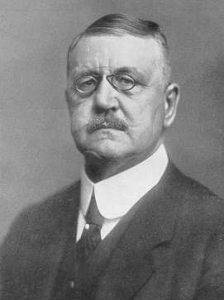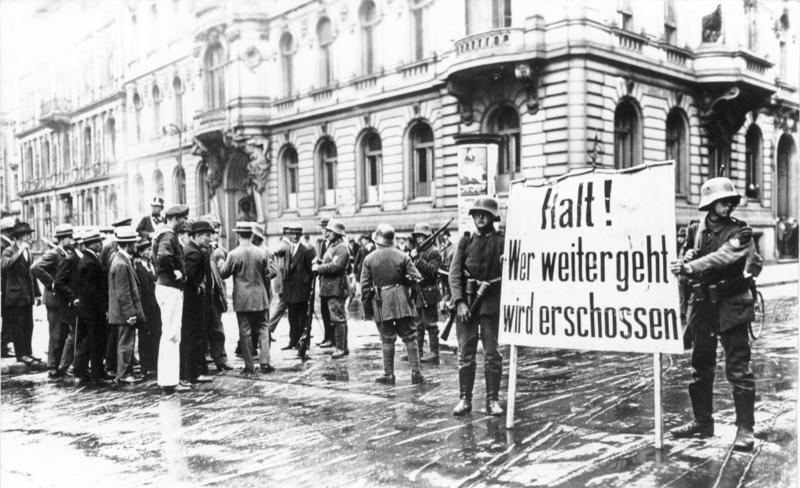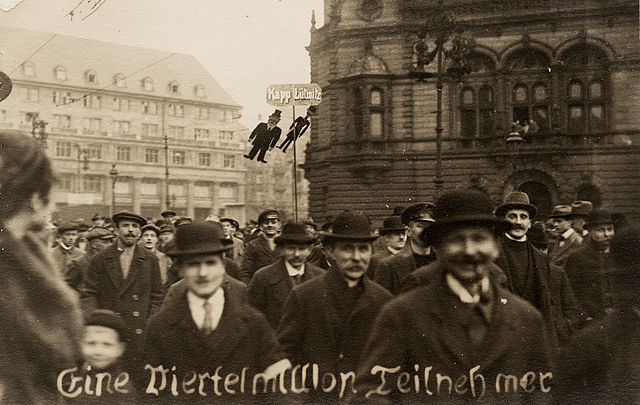Wrapping My Head Around the Weimar Republic, Pt. 5: When Putsch Comes to Shove*
Armed uprisings against the Weimar Republic came from the far right as well as the far left. They often claimed to support “tradition”—a call to Protestantism, family values, or loyalty to the monarchy—but what they had in common was a deep hatred for democracy and a call for an authoritarian alternative to the Weimar Republic. Presumably with them in charge. Case in point: the Kapp putsch of 1920, in which a 62 year old civil servant named Wolfgang Kapp and a cabal of German army officers attempted to overthrow the Weimar Republic and establish an autocratic government.
Even though the attempted coup is known as the Kapp Putsch it was instigated by a group of right-wing military officers. On February 29, the German defense minister, Gustav Noske ordered that two powerful Freikorps units be disbanded.** Both had been active in Munich and Berlin during the Sparticist uprising and both were violently opposed to the idea of a democratic German government in general and Friedrich Ebert’s Weimar Republic in particular. The commander of one of these brigades, Hermann Ehrhardt refused to dissolve his unit. (Does this come as a surprise to anyone?) Worse, General Walther von Lüttwitz, who commanded regular army units stationed in Berlin, announced that he would not accept the loss of such an important unit. (Guess who was involved in the formation of several Freicorps units?) In a meeting with Noske and President Ebert on March 10, Lüttwitz not only demanded that the order to dissolve the Freicorps units be revoked, but that the National Assembly be dissolved, new elections be held for the Reichtag, and that he himself be named the supreme commander of the German army. Not surprisingly, Noske and Ebert told him to shove it (though they were probably more polite about it) and that they expected his resignation the next day.
Instead of resigning, Lüttwitz went to Ehrhardt and asked him if he could occupy Berlin that evening. Ehrhardt asked for another 24 hours to put things in motion. (In other words, he and his Freikorps were organized to start a military coup on 24 hours notice.)
This is the point at which Lüttwitz turned to Kapp and a group of conspirators that included retired general Erich Ludendorff and Waldemar Pabst who had given the order for the murder of Rosa Luxemburg and Karl Liebknecht in the Spartacist uprising. The group had already been plotting [in a low grade way] to establish an authoritarian government that would restore the imperial federal structure, minus the emperor. (Their goal could be described as “government by the upper bureaucrats for the upper bureaucrats.) Lüttwitz asked them to be ready to take over the government on March 13. Unlike Ehrhardt and his militia, they weren’t really prepared for a coup, but they agreed.***
Ehrhardt’s militia marched into the center of Berlin at 10 o’clock on the evening of March 12. (Many of them sported swastikas on their helmets and armbands.)
The regular army, which had put down the far-left Sparticist uprising without compunction, refused to defend the city against the far right-wing militia. Some commanders suggested that the government negotiate with the rebels. Some claimed that their soldiers could not defeat the elite Freicorps. The German commander-in-chief, General Hans von Seeckt, is reported to have said “Reichswehr does not fire on Reichswehr.”
Without the army’s support, the cabinet fled, ten minutes before the Freikorps arrived to occupy the chancellor’s office. By 6:30 in the morning on March 13, the rebels were in possession of Berlin. Kapp declared himself chancellor and formed a provisional government, thus ensuring that the revolt would be known as the Kapp putsch rather than the Lüttwitz putsch. Lüttwitz became commander in chief and Minister of Defense.
It appeared that the conspirators had succeeded. After all, they had the military and the upper echelons of the government bureaucracy on their side.
That turned out not to be enough. On their way out of Berlin, Friedrich Ebert and the other cabinet members who were part of the Social Democratic party put out a call for a general strike to defeat the putsch. The trade unions stepped up. The strike began in Berlin on March 14. By the next day it had spread across the country. Roughly 12 million workers went on strike, including the rank and file of the government bureaucracy who did not share their bosses’ taste for an authoritarian regime. The country was paralyzed.
On March 20, the legitimate government returned to power, after considerable negotiation between the putsch members and the four major political parties. Among other questionable agreements, Hermann Ehrhardt was given a written promise that he would not be arrested as long as he remained in command of his Freikorps brigade. (May I remind you that this whole mess began with the government trying to disband that same unit?) The brigade marched out of Berlin, spraying a crowd of heckling bystanders with machine gun fire as they left, leaving twelve dead and thirty badly wounded.
The unions called off the general strike on March 22. Fifty thousand workers in the Ruhr refused to return to work and began a little uprising of their own. Apparently having learned nothing from the prior six days, Ebert’s cabinet sent in the army and a few Freicorps brigades to put down the Ruhr uprising. (Good way to damage your relationship with the people who saved your bacon, boys.)
The government had survived the Kapp putsch, but it did nothing to solve the underlying problems that led to the coup. The high-ranking army officers (including Lüttwitz!!!) and government functionaries who supported the coup remained in place, as did the Freikorps militia units.
Not good.
* Sorry, I couldn’t resist
**For those of you who missed the last installment in this series of blog posts, the Freikorps were volunteer militias made up of former soldiers of the imperial German army. They were trained and equipped by right-wing officers of the Weimar army. I don’t know about you, but when I hear the term “volunteer militia,” I tend to think of the Minute Men of the American Revolution and other home guard units. That’s not a good analogy for the Freikorps. They were basically groups of right-wing thugs who would evolve into enthusiastic supporters of Hitler and the Nazis.
***Because hey, if someone hands you the coup you’ve been plotting and asks you to be in charge, why not say yes? What could possibly go wrong.
______________________________________
Obviously there is a lot more to say about the Weimar Republic, and I will doubtless be circling back to Weimar-related topics as they catch my attention. In the meantime, I offer this essay from the Five Best Books website, which appeared in my inbox today: The best books on The Weimar Republic, recommended by Robert Gerwarth
For those of you who aren’t familiar with it, the Five Best Books website is a fascinating and dangerous place to learn about books on a wide variety of topics, recommended by experts in those topics. Tread warily.







